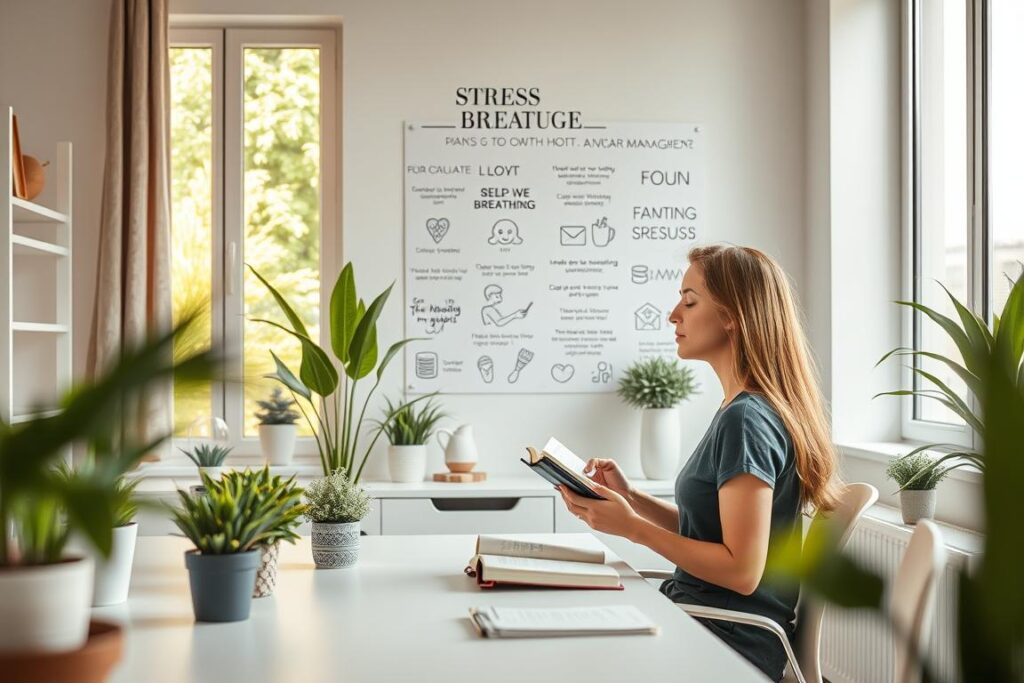Are you feeling overwhelmed by the demands of modern life? Can stress be managed effectively, or is it an inevitable part of our daily lives? The answer lies in adopting the right stress management techniques. According to the Mayo Clinic, getting active, eating a healthy diet, and avoiding unhealthy habits are effective ways to manage stress.
By taking control of stress, we can improve our mental and physical health. We can also increase productivity and enhance our overall quality of life. We can start by incorporating simple stress relief strategies into our daily routines. For more insights on achieving work-life harmony, visit our article on mental health tips.
Key Takeaways
- Effective stress management improves mental and physical health.
- Simple changes to diet and activity levels can reduce stress.
- Avoiding unhealthy habits is key for stress relief.
- Incorporating stress relief strategies into daily routines is beneficial.
- Improving productivity and quality of life is achievable through stress management.
Understanding Stress and Its Impact on Your Life
Stress can really get in the way of our happiness and health. It affects everyone differently. Knowing what stress is, why it happens, and how it feels is key to handling it.
What Is Stress?
Stress happens when we face a change that makes us adjust. It triggers our “fight or flight” response, releasing hormones like adrenaline and cortisol. These hormones help us react to stress, but too much can harm our health.
Chronic stress can cause serious health issues like anxiety, depression, and heart problems. It’s important to see that stress affects our body as well as our mind.
Common Causes of Stress
The American Psychological Association says stress comes from many places. Work, relationships, money, and big life changes are common causes. Knowing what stresses us out is the first step to managing it.
Some common stressors include:
- Work overload or job insecurity
- Relationship conflicts or family responsibilities
- Financial difficulties or debt
- Major life changes, such as moving or losing a loved one
Signs and Symptoms of Stress
Spotting the signs of stress is the first step to dealing with it. Stress can affect our mind, body, and emotions in many ways.
| Mental Symptoms | Physical Symptoms | Emotional Symptoms |
|---|---|---|
| Anxiety or feeling overwhelmed | Headaches or migraines | Mood swings or irritability |
| Difficulty concentrating | Fatigue or sleep disturbances | Feeling overwhelmed or emotional |
| Memory problems | Gastrointestinal problems | Loss of motivation |
By understanding stress, its causes, and symptoms, we can start managing it. Using stress management tips and coping with stress strategies can help us live better lives.
Benefits of Effective Stress Management
Using stress management techniques daily can bring many benefits. It can greatly improve our well-being. This includes better mental health and increased productivity.
Managing stress well can help our mental health in many ways. It can lower anxiety and depression, boost our mood, and improve our thinking. We can use stress management skills like mindfulness, meditation, and relaxation to achieve this.
Improved Mental Health
Stress management can positively affect our mental health. It can lower the risk of anxiety and depression. Using stress management tools like mindfulness and meditation can improve our emotional state and make us more resilient to stress.
A study by the National Center for Complementary and Integrative Health showed mindfulness meditation can reduce stress and anxiety. Adding such practices to our daily routine can lead to better mental health.
Better Physical Well-being
Effective stress management can also boost our physical health. Chronic stress can cause problems like high blood pressure, heart disease, and a weak immune system. By managing stress, we can lower these risks and improve our physical health.
Some stress management exercises that can help our physical health include physical activity. Activities like walking, jogging, or yoga can reduce stress, improve our mood, and enhance our physical health.
Enhanced Productivity
Stress management can also make us more productive. It can improve our focus, concentration, and work performance. When we’re stressed, it’s harder to concentrate and make decisions. By managing stress, we can work more efficiently and achieve our goals better.
For example, using stress management skills like time management and prioritization can reduce stress and improve work performance. Relaxation techniques, such as deep breathing or meditation, can also help us stay focused and productive.
Practical Tips for Managing Stress Daily
We can control our stress by adding simple habits to our day. Making small changes in our routine can greatly reduce stress. This improves our overall health and happiness.
Establish a Routine
Having a daily routine gives us structure and normalcy, easing stress. It means setting regular times for waking up, eating, exercising, and sleeping.
- Set a consistent wake-up time to start your day on a positive note.
- Schedule time for relaxation and leisure activities.
- Plan your meals in advance to ensure healthy eating.
Prioritize Self-Care
Self-care is key to managing stress. It means taking care of our physical, emotional, and mental health.
Simple self-care practices include:
- Doing things that make you happy, like hobbies or time with loved ones.
- Practicing mindfulness or meditation to calm your mind.
- Getting enough sleep to help your body and mind recharge.
The Mayo Clinic says getting enough sleep, eating well, and exercising regularly can help manage stress. By adding these habits to our daily routine, we can handle stress better and live a better life.
Stay Organized
Being organized helps us feel in control of our tasks and responsibilities. This reduces stress.
- Create a to-do list to help you stay on top of tasks.
- Break down larger tasks into smaller, manageable chunks.
- Use a calendar or planner to keep track of appointments and deadlines.
By using these practical tips every day, we can manage stress better and feel better overall. Remember, it’s about making small changes that add up over time.

The Role of Physical Activity in Stress Reduction
Physical activity is a great way to lower stress and boost our mental health. It can make us feel better, more energetic, and happier. The American Psychological Association says it’s good for our well-being.
Physical activity makes our body release endorphins, or “feel-good” hormones. These hormones help us feel less stressed and anxious. Plus, it helps us relax and unwind, making stress easier to handle.
Types of Exercises to Consider
There are many exercises that can help reduce stress. Here are a few:
- Cardiovascular exercises: Running, cycling, or swimming can lower stress and improve health.
- Yoga and Pilates: These exercises help us relax and improve flexibility and balance.
- Strength training: It builds confidence and reduces stress.
Finding Activities You Enjoy
Finding activities we like makes it easier to stick to them. We can try:
- Joining a gym or fitness class
- Taking up a new sport or activity, like tennis or hiking
- Doing physical activities with friends or family, like walking or dancing
How Often Should You Exercise?
How often we exercise depends on our goals and fitness level. Starting with 30 minutes a day, three to five times a week is a good start. As we get more comfortable, we can do more.
Adding physical activity to our daily lives helps manage stress and improves well-being. We can take charge of our stress and mental health by prioritizing exercise.
Mindfulness and Meditation Practices
We’re looking into how mindfulness and meditation help us manage stress. These stress management exercises boost our mental health and well-being.
The National Center for Complementary and Integrative Health says these practices lower stress and improve mental health. They positively affect our mental and physical health, making them key for managing stress.
What is Mindfulness?
Mindfulness means being fully present and aware of the moment. It involves noticing our thoughts, feelings, and body sensations without judgment. This practice reduces stress and anxiety, improves mood, and sharpens our minds.
Here are some easy ways to practice mindfulness:
- Focus on our breath and body sensations
- Try mindful movement like yoga or tai chi
- Use mindfulness meditation to find calm and relaxation
Simple Meditation Techniques
Meditation is a strong tool for lowering stress and boosting mental health. Here are some simple techniques:
- Focus on breath or a mantra for calm
- Try guided meditation to handle thoughts and emotions
- Practice loving-kindness meditation for compassion and empathy
For more on stress management, check out this resource. It offers tips on managing stress and preventing chronic diseases.
Incorporating Mindfulness into Daily Life
Adding mindfulness to our daily routine is easy. Just set aside a few minutes each day for mindfulness, whether through meditation or simply noticing our surroundings.
Here are ways to bring mindfulness into our daily lives:
- Start the day with a mindfulness meditation
- Practice mindful eating to enjoy our food and feel grateful
- Do mindful movement like walking or yoga to feel connected to our bodies
The Importance of Social Support
We often don’t realize how much social connections help us deal with stress. Having a strong support system can greatly help us manage stress and feel better overall.
The Mayo Clinic says social support can lower stress and boost mental health. This is because having people we trust makes us feel less alone and more supported.
Building a Support Network
To create a support network, start by reaching out to those closest to us, like friends and family. They can offer emotional support, practical help, and new views on our problems.
- Identify people you trust and feel comfortable with.
- Make an effort to stay in touch with them regularly.
- Be open about your struggles and needs.
Reaching Out to Friends and Family
Reaching out to friends and family is easy. Just make a phone call, send a message, or meet up for coffee. These actions can make our bonds stronger and give us emotional support.
Joining Support Groups
Joining a support group can also be helpful. These groups offer a place to share our experiences and connect with others facing similar challenges.

By building and using our social support network, we can find effective stress relief strategies. This improves our stress management tips and helps us better cope with stress.
Lifestyle Changes That Aid Stress Management
We can control our stress by making lifestyle changes. Simple adjustments can lower our stress and boost our well-being.
Healthy Eating Habits
Eating well is key to managing stress. Foods full of vitamins and antioxidants support our mental health. Adding fruits, veggies, whole grains, and lean proteins to our diet helps a lot.
A healthy diet aids stress by fueling our brain. For instance, omega-3 rich foods like salmon can ease anxiety and depression.
| Food Group | Examples | Benefits |
|---|---|---|
| Fruits | Apples, Berries, Oranges | Rich in Vitamins and Antioxidants |
| Vegetables | Leafy Greens, Broccoli, Carrots | High in Fiber and Essential Minerals |
| Proteins | Salmon, Chicken, Beans | Supports Mental Health and Energy |
The Value of Sleep
Enough sleep is vital for stress management. A good night’s sleep balances our stress hormones and repairs our bodies. Adults need 7-9 hours to feel refreshed.
Stick to a sleep schedule and have a calming bedtime routine. Avoid caffeine and screens before bed to sleep better.
Reducing Stimulants
Lowering or stopping caffeine and nicotine cuts stress. These substances raise heart rate and blood pressure, making us feel more anxious.
Slowly cut down on these stimulants to avoid withdrawal. Find other ways to stay awake, like walking or deep breathing.
Seeking Professional Help When Needed
When stress gets too much, it’s time to think about getting professional help. Managing stress is a personal journey. Sometimes, we need extra support and guidance to get through tough times. The National Center for Complementary and Integrative Health says getting help can offer more support and guidance for managing stress.
Recognizing the need for professional help is a big step in managing stress well. We should look for help if we feel anxious, depressed, or if stress is really affecting our daily life.
Indicators for Therapy
There are signs that tell us it’s time to think about therapy. These include:
- Persistent stress that interferes with daily life
- Feelings of overwhelm or hopelessness
- Difficulty managing emotions
- Strained relationships due to stress
Different Types of Professional Help are available, meeting various needs and preferences. These include:
- Cognitive-behavioral therapy (CBT)
- Mindfulness-based stress reduction (MBSR)
- Psychodynamic therapy
- Group therapy sessions
Preparing for Therapy
Before getting professional help, it’s good to think about what we want to achieve. Formulating questions to ask a therapist can also make the process more effective. Some questions to consider include:
- What experience do you have in stress management?
- What approaches or techniques do you use?
- How will we track progress?
By seeking professional help, we can get access to stress management tools, stress management skills, and stress management exercises that fit our needs. This can help us manage stress more effectively.
Creating a Stress Management Plan
Creating a stress management plan is key to handling stress better. It helps us feel better mentally and physically. By making a plan that fits us, we can deal with stress more effectively.
Setting Achievable Objectives
We should start by setting goals that fit our lifestyle and stress levels. This means finding what works for us, like exercise or mindfulness. For tips on balancing work and life, check out Prosper Glow’s guide.
Monitoring Progress and Adjusting
It’s important to track how well our plan is working. By checking our stress levels and what helps, we can tweak our plan. This keeps it working well for us.
Refining the Plan
Our lives and stress levels change, so our plan should too. Trying new ways to manage stress and adjusting our plan helps us stay on top of stress. This way, we can keep improving our life quality.



